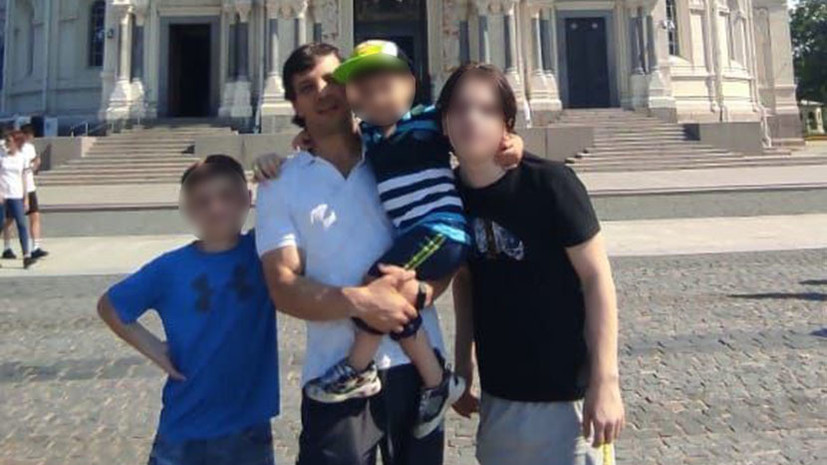"They said: wait"
Tatyana Marchenko, 50, lived in Severodonetsk with her two nieces, Arina and Valeria.
The eldest, Arina, is eight years old, Valeria is seven.
After her sister, the mother of the girls, died, Tatyana herself began to raise them and took care of them.
When Severodonetsk was under shelling by the Armed Forces of Ukraine, Marchenko and his nieces hid in the basement.
There she met a woman who offered to go to St. Petersburg together, where she had relatives.
As Tatyana told RT, the new acquaintance really helped her and her nieces by placing them with her elderly relative.
But soon the hostess became seriously ill, and Marchenko and the girls had to move out.
The family managed to find dilapidated housing outside the city, where they were allowed to stay until the end of the summer.
At the same time, the woman had problems with the preparation of the necessary documents: “We applied for temporary asylum on May 27, but there was no answer for a long time.
I called, found out, and they only told me: “Wait,” Tatyana told RT.
Marchenko received the status allowing her to apply for temporary asylum more than a month after RT sent a corresponding request.
The press service of the Ministry of Internal Affairs clarified that, according to the law, the period for consideration of applications can be up to three months: “However, due to a significant increase in the number of citizens arriving on the territory of the Russian Federation in an emergency mass order from the territories of Ukraine, the Donetsk and Luhansk People's Republics, the reception and consideration of their applications for temporary asylum is carried out within a period not exceeding three working days from the date of submission of the application.
At the same time, as noted in the department, “despite the most simplified procedure for processing documents, as well as the priority consideration of applications from citizens of this category by employees of the migration departments of the territorial bodies of the Ministry of Internal Affairs of Russia, there are some problematic situations (for example, the absence of an identity document, the absence host, etc.).
Now Tatyana Marchenko is trying to get custody of her nieces already in Russia.
“I brought all the Ukrainian documents, they helped me translate them into Russian, but it was not clear what to do next.
And in any case, new documents are needed, because without them you can neither issue benefits, nor send girls to school.
Even if we return to Severodonetsk, we need to make a new citizenship,” she says.
After Tatyana issues guardianship, she will be able to receive the support required by law.
According to Alexandra Dokuchaeva, head of the Department of Diaspora and Migration at the Institute of CIS Countries, Marchenko should not worry that someone will take away her children during this time.
“There is presidential decree No. 187, which, in particular, carefully spells out how citizenship is issued for children deprived of parental care.
The procedure is quite simple, and there should be no pitfalls, ”the expert noted.
Daria Nechaikina, head of social services at the Teply Dom charity foundation, which helps the family, says that despite the difficult situation, Tatyana does her best to take care of the girls.
“They have nowhere to live, no money.
Tatyana is a kindergarten teacher by profession.
Without temporary shelter, she could not get a job.
Now she hopes to find a place, but still there is a problem with housing - the teacher’s salary for paying him and raising two children, of course, is not enough, ”she says.
"Come, let's figure it out"
Sergei Mikhailchenko, a 43-year-old native of Alchevsk (LPR), also found himself in a difficult situation.
He went to work in Russia, and his wife at that time was raising four children.
Artyom is now 15 years old, Maxim is 13, Denis is 12, and Igor is four.
Last November, Sergei, himself a Russian passport holder, applied for citizenship for his children.
And in December, his wife died suddenly.
Mikhailchenko moved the children to St. Petersburg, now they all live together with his mother-in-law.
But the process of obtaining citizenship has stalled, the man told RT.
“At first, I didn’t even know where to turn to complete the procedure for obtaining citizenship for children.
I called Lugansk, but they didn’t explain anything there, they said: come, we’ll figure it out on the spot.
Then social activists helped, they found out that the documents were already in the Rostov region.
But in order to complete the design, it is necessary that fingerprints be taken from the children, ”complains Sergey.
Taking four children from St. Petersburg to the Rostov region, given the transport restrictions, is difficult and expensive.
The man asked to be allowed to undergo the necessary procedures at the place of residence, but at first he was refused.
Then Mikhailchenko turned to RT and to State Duma deputy Artyom Turov.
“An application for accepting children into Russian citizenship has already been submitted in the Rostov region, but it is obvious that for a person in such a difficult life situation it is extremely problematic now to take four children to the Rostov region to complete the paperwork.
We solve such situations on an individual basis and help children left without a mother to obtain citizenship without leaving St. Petersburg, ”the parliamentarian told RT.
Sergei Mikhailchenko hopes that the documents will be processed in the next month or two: “Otherwise, I won’t even be able to send my children to school.”

